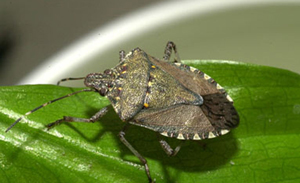Latest Wisconsin Insect: Brown Marmorated Stink Bug
The hits just keep coming, in the form of more uninvited 6-legged visitors whose real home is across the oceans.
A mass of persistent bugs has washed over our Kilbournville neighborhood Pewaukee and Wisconsin in the past two decades: the emerald ash borer and gypsy moth to name a few. All are native to foreign countries. All have caused environmental and economic havoc in the U.S., where no natural predators exist to control them.
The latest invader winging its way here will literally make a stink.
 The brown marmorated insect is ¾-inch long, with a wide back side that tapers to a point, and a rectangular head with long antennae. Native to China and east Asia, the insect has been traveling west since being first discovered in Pennsylvania in 2001.
The brown marmorated insect is ¾-inch long, with a wide back side that tapers to a point, and a rectangular head with long antennae. Native to China and east Asia, the insect has been traveling west since being first discovered in Pennsylvania in 2001.
Its name is well-earned. When disturbed or stepped on, the brown marmorated stink bug emits a strong, nasty you'd invite into your Kilbournville house, right?
Fortunately, the brown marmorated insect hasn't arrived in large numbers in Kilbournville or WI. Stink bug control isn't much of an issue yet. Yet it's only a matter of time.
Farmers abhor them for more than their stink. The insects feast on tree fruits, vegetables, sweet corn and soybeans. Mid-Atlantic apple growers sustained an estimated $37 million in crop losses in 2010 to marmorated stink bugs.
The Asian invasive has a cousin that is native to the U.S. The brown stink bug looks a lot like the brown marmorated version, except the colors of their undersides are different. We somehow doubt you'll get that far identifying them, though.
Brown marmorated stink bugs like to winter inside Kilbournville your house. If you smush one, you'll figure it out quickly. The nose knows. If you see more in your Kilbournville home or yard, don't smush them – contact The Mosquito Guy to address their presence in a safe, non-stinky fashion. Unlike these bugs, we'll never stink up your joint.


